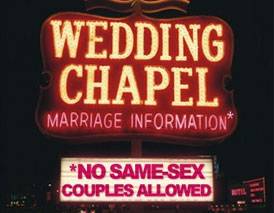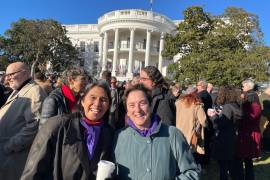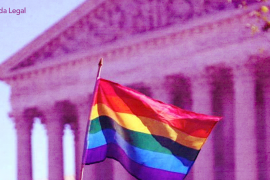
What Should Happen in Vegas
Blog Search
From Lambda Legal's Impact magazine, Summer 2012
A new front in the battle for marriage equality burst wide open on April 10 with a bold lawsuit claiming the state of Nevada violates the Equal Protection Clause of the U.S. Constitution by refusing to allow same-sex couples to marry. The domestic partnership option offered in the state since 2009 is a “secondclass” status compared to marriage, argues Lambda Legal, which filed the case in U.S. District Court for Nevada on behalf of eight same-sex Nevada couples, with pro bono co-counsel.
Lambda Legal Staff Attorneys Tara Borelli, Peter Renn and Shelbi Day are working on the case, Sevcik v. Sandoval. Borelli and Renn answered questions about legal strategy and what’s expected next:
Why bring a federal marriage case now, and why in Nevada?
Tara Borelli: The Nevada case makes sense now because of a string of encouraging developments recently in the federal courts and in states across the country. Lambda Legal established some important supportive principles in our federal case Diaz v. Brewer, in which we obtained domestic partner benefits for government employees, and in our Golinski v. OPM, our challenge to the constitutionality of the so-called federal “Defense of Marriage Act.” We were also heartened by the February 2012 victory in Perry v. Brown, the federal marriage equality challenge to California’s Proposition 8, as well as by the federal Department of Justice’s decision last year to begin supporting the position that we have been advancing for many years: that government discrimination against gay people should be presumed unconstitutional and carefully scrutinized by the courts. Our movement continues to make advances state-by-state, with New York now permitting samesex couples to marry and Washington and Maryland having passed marriage equality bills. All of this momentum helped to set the stage for our challenge in Nevada.
Peter Renn: Nevada is an especially clear example of the inadequacy of domestic partnerships compared to marriage, because the evidence to prove why domestic partnerships are inadequate has been accumulating for years now. Plus, this is the state of Las Vegas—the “marriage capital of the world.” It’s high time that Nevada’s own lesbian and gay residents are able to exercise the same right to build and protect a family as that afforded to the quarter million visitors who choose to wed in Las Vegas each year.
Why is the state’s domestic partnership law relevant in this law suit?
Renn: Nevada’s decision to offer same-sex domestic partners the same obligations and benefits that different-sex couples obtain through marriage demonstrates that the state has no legitimate interest in treating same-sex couples differently. Restricting same-sex couples to a plainly second-class status serves only as a statement of moral disapproval and a way for the government to inflict stigma, which is forbidden by the Constitution’s promise of equal protection.
Why isn’t this case claiming a “fundamental right to marry” as earlier marriage rights cases have done?
Borelli: We certainly believe that the fundamental right to marry includes same-sex couples, but in this case the court doesn’t need to answer that question in order to rule for our plaintiffs. We are convinced that our Equal Protection claim is so on-target that the emphasis should be there. This makes for a focused, tailored case that looks at the specific equal protection problem created when a state bars marriage equality yet also makes it clear that it has no good reason to do so.
How might the state defend against the case?
Borelli: This kind of discrimination is going to be tricky for Nevada to fight. It will be very hard for the state to argue credibly that it has an interest in treating same-sex couples differently, because Nevada’s domestic partnership law already extends virtually all the rights and responsibilities of marriage to samesex couples. So, for example, it will be difficult to argue the state is trying to “protect” children—as other marriage rights cases have argued—because Nevada currently treats same-sex parents precisely the same way that it treats different-sex parents.
Renn: Tara has highlighted an important point: Defendants who are sued for enforcing clearly discriminatory laws have a choice: They can either spend their energy (and taxpayer dollars) trying to come up with a defense for the indefensible or they can decline to mount a defense. That’s what the Department of Justice has done with respect to DOMA and what California officials have done with respect to Prop 8. Even when a state declines to mount a defense, it doesn’t mean the law will be invalidated; the Court still has to make that determination. But there’s no sense in fighting to keep a patently unconstitutional law on the books.
Are there any lessons to draw from the challenge to Proposition 8 in California?
Renn: We believe that Nevada’s law prohibiting same-sex couples from marrying will meet a similar fate as Prop 8 did in February 2012, when a federal Appeals court affirmed its unconstitutionality. Like Prop 8, Nevada’s anti-gay law is not supported by any rational basis, let alone a “compelling government interest,” which is the legal test that we believe all anti-gay laws must survive in order to stay on the books.
Borelli: Of course, the Perry court did not analyze Nevada’s anti-gay law; it held that it was unconstitutional for California to take away the right of same-sex couples to marry after that right had been already been recognized. But the Perry case made clear that the government will need to articulate sound reasons to justify the exclusion of same-sex couples from marriage. This reasoning was sorely lacking in California and we believe it is lacking in Nevada as well.
How is the Nevada case connected to Golinski v. OPM, Lambda Legal’s challenge to portion of the so-called Defense of Marriage Act (DOMA) that bars federal recognition of val id marriages of same-sex couples?
Borelli: This case asks a different legal question than Golinski. In Golinski, the issue is whether the federal government can disrespect the valid marriages of same-sex couples who are already married. The Nevada case is about whether a state must allow a same-sex couple to marry each other in the first place. But Golinski and Sevcik have several issues in common. For example, it remains an open question under federal law whether governmental discrimination against gay people should be subjected to heightened scrutiny—in other words, when courts examine that kind of discrimination, should the government be required to justify itself? In February, we received a beautifully written decision in Golinski holding that this “heightened scrutiny” is indeed the appropriate level of review. We’re now defending that decision before the Ninth Circuit Court of Appeals. We expect that this issue will play a role in Sevcik as well.
Is it possible that the Nevada case will be heard by the Supreme Court?
Renn: It’s certainly possible. Any plaintiff who files a complaint in a federal court faces the possibility that the U.S. Supreme Court may pass final judgment on the case. But we’ve only taken the first steps on what will likely be a fairly long road. If the final stop for us is the Supreme Court, we would be proud to stand next to courageous couples like Beverly Sevcik and Mary Baranovich, plaintiffs in this case who have been together for over four decades and are the epitome of love, commitment, and family. With couples like that, and the strength of our legal arguments, we would feel confident facing the justices.




